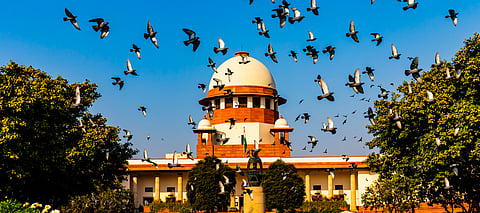

THE Supreme Court today upheld the constitutional validity of the Scheduled Castes and Scheduled Tribes (Prevention of Atrocities) Amendment Act, 2018 (Act of 2018) that had diluted the effect of the Supreme Court's decision in Dr. Subhash Kashinath Mahajan v. The State of Maharashtra which had among other things held that there was no absolute bar against grant of anticipatory bail in cases under the Atrocities Act if no prima facie case is made out or where on judicial scrutiny the complaint is found to be prima facie mala fide.
A three-judge bench comprising Justices Arun Mishra, Vineet Saran and Ravindra Bhat while dismissing the challenge said provision of anticipatory could be applied in cases of atrocities if the complaint did not make out a prima facie case for applicability of the provisions of the Act of 1989, the bar created by section 18 and 18A (i) shall not apply.
Justice Bhat in his opinion separate but concurring opinion emphasised on the need to develop the idea of fraternity, which he said: "is lessor explored areas in the constitutional discourse of this court".
He said, "fraternity is as important a facet of the promise of our freedoms as personal liberty and equality is".
While underlying the crucial place of the idea of fraternity in the scheme of nation's consciousness and polity, Justice Bhat said:
"The fraternity assured by the Preamble is not merely a declaration of a ritual handshake or cordiality between communities that are diverse and have occupied different spaces: it is far more the articulation of fraternity as a constitutional value, has lamentably been largely undeveloped".
"All the three – Liberty, Equality and Fraternity, are intimately linked. The right to equality, sans liberty or fraternity, would be chimerical – as the concept presently known would be reduced to equality among equals, in every manner- a mere husk of the grand vision of the Constitution. Likewise, liberty without equality or fraternity can well result in the perpetuation of existing inequalities and worse, result in license to indulge in society's basest practices. It is fraternity, poignantly embedded through the provisions of Part III, which assures true equality, where the state treats all alike, assures the benefits of growth and prosperity to all, with equal liberties to all, and what is more, which guarantees that every citizen treats every other citizen alike", Justice Bhat stated.
On March 20, 2018, the Supreme Court in its Kashinath Mahajan judgement effectively diluted the provisions of the Atrocities Act.
A two-judge bench comprising Justices A K Goel and U U Lalit laid down "procedural safeguards" so as to prevent the misuse of the Scheduled Castes and Scheduled Tribes (Prevention of Atrocities) Act, 1989.
The three safeguards as introduced by the Kashinath Mahajan judgement were:
Following the judgement, there was an uproar from the Dalit and Adivasi groups which lead to nation-wide violent protests. Even before the Supreme Court could hear the review petition, the Parliament passed the 2018 amendment to the atrocities Act.
The Parliament through the Scheduled Castes and Scheduled Tribes (Prevention of Atrocities) Amendment Act, 2018 introduced Section 18A to overturn the safeguards as was introduced by in the Kashinath Mahajan judgement.
The central government in its affidavit, filed on October 29, 2018, put on record that the high rates on acquittals in the cases filed under the atrocities Act cannot be the basis for the assumption that a majority of the cases filed under the law are false. The central government also affirmed that the Parliament is competent to bring an amendment to the atrocities Act.
The apex court on January 24, 2019, clubbed the review petition challenging the Kashinath Mahajan judgement and the plea challenging the 2018 amendment.
On October 1, 2019, a three-judge comprising Justices Arun Mishra, M R Shah and B R Gavai recalled the order of the court rendered in the Kashinath Mahajan judgement through the following directions:
After a hearing the parties for three consecutive days, the court on October 3, 2019, reserved the judgement which was delivered today, on February 10, 2010.
In the challenge to the constitutional validity of the 2018 Amendment, the apex court had the following issues:
The aim of the legislation when it was drafted was to provide maximum protection to a vulnerable section of society and create a societal structure that encourages, enables them to report the targeted crimes committed against them.
By way of introducing the safeguards for misreported cases in the Kashinath Mahajan judgement would only prove to further alienate the Dalit and Adivasi community and allow the continuing domination of the ugly and ubiquitous caste system in our society.
The judgement is a victory in the long-standing legal battle of challenge against the atrocities Act which ensures social justice for the people from the Scheduled Castes and Scheduled Tribes.